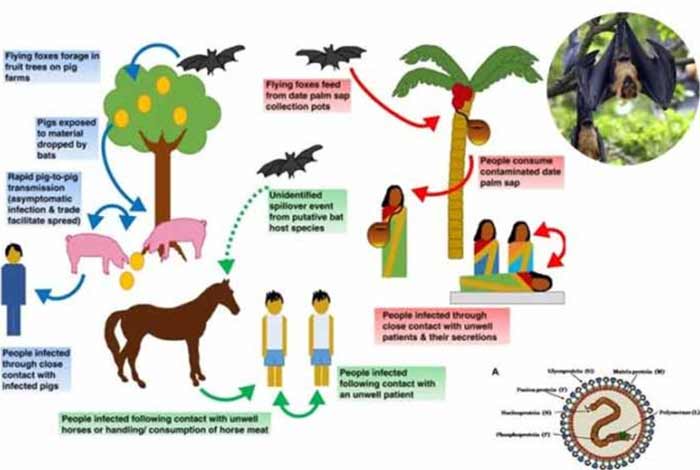
Nipah (NiV) Virus Infection – Don’t Panic and Get Your Facts Right!

What is Nipah Virus?
Nipah virus (NiV) is a newly emerging virus that originally infected animals but can cause disease in humans as well. In 1998, an outbreak of acute encephalitis with high mortality rates among pig handlers in Malaysia led to the discovery of this novel virus named Nipah virus.
Nipah infection is a zoonosis. Zoonosis is a disease that can be transmitted to humans from animals and transmission occurs when an animal infected with bacteria, viruses, parasites, and fungi comes into contact with humans. Nipah virus is the recent addition to list of zoonosis which also includes African sleeping sickness, anthrax, bird flu, encephalitis, ebola, flu, rabies, tuberculosis and others. The natural host for this disease is a fruit bat, belonging to the family Pteropodidae, genus Pteropus. [1]
Transmission of Nipah Virus
The first case of NiV was identified in Kampung Sungai, Nipah, Malaysia in 1998. During this outbreak, pigs were the intermediate hosts. However, in the subsequent cases, no intermediate hosts have been identified. In 2004, people in Bangladesh got infected with the nipah virus after consuming date palm sap that was contaminated by infected fruit bats. In India, there have been evidence of human to human transmission of the infection, even in a hospital setting. The main concerning factor about NiV infection is its ability to get transmitted through air and infect other healthy humans.
Symptoms of NiV Infection
There are a number of ways in which NiV infection manifests itself in humans. Some of the signs and symptoms of NiV infection are as follows:
- Fever
- Headache
- Fainting
- Nausea
- Vomiting
- Choking
- Stomach pain
- Fatigue
When a person gets infected with NiV, there are chances of developing brain inflammation as well which can lead to another set of symptoms like confusion, persistent drowsiness and disorientation. The disease can progress very rapidly and the person can go into coma within 24-48 hours if proper treatment is not made available.
Diagnosis
For diagnosing NiV infection, blood tests are performed. The sample is evaluated by using real-time polymerase chain reaction technique through which the virus is identified. The RNA of the virus can also be isolated from saliva and identified. The virus has been classified internationally as a biosecurity level (BSL) 4 agent which means that that agent is extremely contagious in nature and requires utmost precaution for handling it. However, for handling inactive specimens, BSL 2 facilities can be used.
Treatment and Prevention
As of now, there are no vaccines available to prevent or treat this disease. It is only possible to manage this disease through intensive support system. However, some of the precautionary measures that can be taken to prevent infection include;
- Avoiding consumption of infected raw date palm juice
- Avoiding direct contact with infected bats, humans and pigs
- Covering mouth and wearing gloves when in public places
- Washing hands properly before eating
- Avoiding crowded places
- Isolating the patient
- Avoiding consumption of infected pork
There have been a few trials to develop vaccines against the infection but none has shown much promise. Ribavirin, an antiviral medicine and chloroquine have been tried to manage the symptoms of the infection but have shown moderate results. Monoclonal antibody injections have also been tried but have shown no significant response.
Preventing Spread of Virus to Animals
Animals are also susceptible to get infected with this virus, especially pigs. Therefore, wire screens can be used for keeping the pigs safe from contracting the infection from bats. Roof run offs should not be allowed to enter pig pens. If any pig or a group of pigs is suspected to show signs and symptoms of nipah virus infection, they should be isolated and sacrificed. Since the disease is extremely infectious in nature, mass culling of animals might become necessary.
Why Should You Not Panic?
If you are in an area where there has been an outbreak of the nipah virus, don’t panic. You can follow some of these tips to ensure that you do not fall prey to this infection:
- Avoid public places
- Maintain proper hygiene
- Do not drink date palm juice
- Stay hydrated
- Stay away from people who are showing even the minor symptoms
- If you observe someone developing symptoms, call for emergency medical help immediately
- Wear gloves and masks before going out
- If the situation becomes too severe, you can relocate
Nipah virus is a newly evolving virus that is infecting humans. Some of the deadliest infections are indeed viral in nature. However, through due diligence, it is possible to keep yourself and your family members safe.




